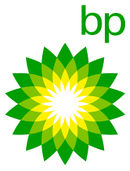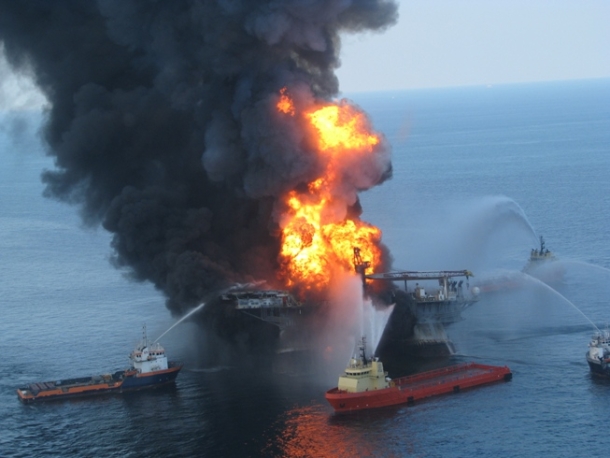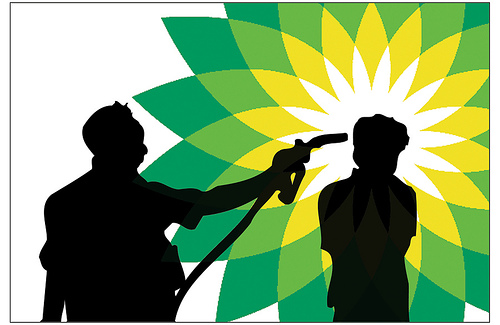BEYOND PETROLEUM
Oil giant says the era of demand growth is over in profound break from orthodoxy
U.K. giant BP is describing a different future, where oil's supremacy is challenged, and ultimately fades
Bloomberg News Publishing date:Sep 13, 2020 •

BP Plc said the relentless growth of oil demand is over, becoming the first supermajor to call the end of an era many thought would last another decade or more.
Oil consumption may never return to levels seen before the coronavirus crisis took hold, BP said in a report on Monday. Even its most bullish scenario sees demand no better than “broadly flat” for the next two decades as the energy transition shifts the world away from fossil fuels.
BP is making a profound break from orthodoxy. From the bosses of corporate energy giants to ministers from OPEC states, senior figures from the industry have insisted that oil consumption will see decades of growth. Time and again, they have described it as the only commodity that can satisfy the demands of an increasing global population and expanding middle class.
BP's energy outlook shows consumption slumping 50% by 2050 in one scenario, and by almost 80% in another
The U.K. giant is describing a different future, where oil’s supremacy is challenged, and ultimately fades. That explains why BP has taken the boldest steps so far among peers to align its business with the goals of the Paris climate accord. Just six months after taking the top job, chief executive Bernard Looney said in August he’d shrink oil and gas output by 40 per cent over the next decade and spend as much as US$5 billion a year building one of the world’s largest renewable-power businesses.
That’s because he suspects oil use may already have peaked as a result of the pandemic, stricter government policies and changes in consumer behavior. BP’s energy outlook shows consumption slumping 50 per cent by 2050 in one scenario, and by almost 80 per cent in another. In a “business-as-usual” situation, demand would recover but then flatline near 100 million barrels a day for the next 20 years.
BP isn’t the only big oil company adapting its business to the energy transition. Royal Dutch Shell Plc, Total SE and others in Europe have announced similar pivots toward cleaner operations as customers, governments and investors increasingly call for change.
Three Possible Futures
BP’s report comes ahead of three days of online briefings starting Monday on its clean-energy and climate strategy. The study considers three scenarios, which aren’t predictions but nevertheless cover a wide range of possible outcomes over the next 30 years and form the basis of the new strategy Looney announced in August.
The “Rapid” approach sees new policy measures leading to a significant increase in carbon prices. The “Net Zero” course reinforces Rapid with big shifts in societal behavior, while the “Business-as-usual” projection assumes that government policies, technology and social preferences continue to evolve as they have in the recent past.
In the first two scenarios, oil demand falls as a result of the coronavirus, the report shows. “It subsequently recovers but never back to pre-COVID levels,” according to Spencer Dale, BP’s chief economist. “It brings forward the point at which oil demand peaks to 2019.”
That contrasts with what many others are forecasting. Russell Hardy, chief executive officer of trading giant Vitol Group, said on Monday that oil demand is poised for 10 years of growth before a steady decline. He predicts consumption will return to pre-virus levels by the end of next year.
BP’s outlook last year contained a scenario called “More energy,” which had oil demand growing steadily to about 130 million barrels a day in 2040. There’s no such scenario this time.
“Demand for oil falls over the next 30 years,” BP said in the report. “The scale and pace of this decline is driven by the increasing efficiency and electrification of road transportation.”
COVID Impact
The pandemic shattered oil consumption this year as countries locked down to prevent infections from spreading. While demand has since improved, and crude prices with it, the public health crisis is still raging in many parts of the world and the outlook remains uncertain in the absence of a vaccine.
The impact, including lasting behavioral changes like increased working from home, will affect economic activity and prosperity in the developing world, and ultimately demand for liquid fuels, according to BP. That means it won’t be able to offset already falling consumption in developed countries.
Demand for liquid fuels is seen falling to less than 55 million barrels a day by 2050 in BP’s Rapid scenario, and to around 30 million a day in Net Zero. The drop is mostly in developed economies and in China. In India, other parts of Asia and Africa, demand remains broadly flat in the first scenario but slips below 2018 levels from the mid-2030s in the second.
Other points in the energy outlook:
The Rapid scenario has carbon emissions from energy use falling by around 70 per cent by 2050, while they drop by more than 95 per cent in Net Zero. Business-as-usual sees them peaking in the mid-2020s.
Demand for all primary energy — the raw materials from which energy is derived — increases by about 10 per cent in Rapid and Net Zero in the period, and by around 25 per cent in the third scenario.
In Rapid, non-fossil fuels account for the majority of global energy from the early 2040s.
Growth in China’s energy demand slows sharply relative to past trends, reaching a peak in the early 2030s in all three scenarios.
Renewable energy — excluding hydro — increases more than tenfold in both Rapid and Net Zero, with its share in primary energy rising from 5 per cent in 2018 to more than 40 per cent by 2050 in Rapid and almost 60 per cent in Net Zero.
Natural gas consumption is seen broadly unchanged to 2050 in Rapid and around 35 per cent higher in business-as-usual. Demand falls by about 40 per cent by 2050 in Net Zero.
BP's "Beyond Petroleum" Campaign Losing its Sheen
Submitted by Anne Landman on
 Back in July, 2000, British Petroleum launched a high-profile, $200 million public relations ad campaign designed by Ogilvy & Mather to position the company as environmentally-friendly. The company introduced a new slogan, "Beyond Petroleum," and changed its 70 year-old, sheild-style logo to a new, cheerful green and yellow sunburst. To many, the "Beyond Petroleum" campaign has always been ludicrous. After all, not only did it pitch BP's smallest energy sector while ignoring its major one, but BP's investment in extractive oil operations dwarfed its investment in renewable energy. BP spent a mere $45 million in 1999 to buy a solar energy company called Solarex -- a microscopic acquisition compared to the $26.5 billion it invested to buy ARCO to expand its oil drilling portfolio. BP is also the company behind the environmentally controversial (and some would say disastrous) oil sands project in Alberta, Canada. Now, in the wake of the massive oil spill in the Gulf of Mexico, BP's greenwashing campaign looks even less slick. The company's hypocrisy and greenwashing have risen to the surface, and are spreading uncontrollably.
Back in July, 2000, British Petroleum launched a high-profile, $200 million public relations ad campaign designed by Ogilvy & Mather to position the company as environmentally-friendly. The company introduced a new slogan, "Beyond Petroleum," and changed its 70 year-old, sheild-style logo to a new, cheerful green and yellow sunburst. To many, the "Beyond Petroleum" campaign has always been ludicrous. After all, not only did it pitch BP's smallest energy sector while ignoring its major one, but BP's investment in extractive oil operations dwarfed its investment in renewable energy. BP spent a mere $45 million in 1999 to buy a solar energy company called Solarex -- a microscopic acquisition compared to the $26.5 billion it invested to buy ARCO to expand its oil drilling portfolio. BP is also the company behind the environmentally controversial (and some would say disastrous) oil sands project in Alberta, Canada. Now, in the wake of the massive oil spill in the Gulf of Mexico, BP's greenwashing campaign looks even less slick. The company's hypocrisy and greenwashing have risen to the surface, and are spreading uncontrollably.
Beyond Disastrous
 The oily environmental disaster in the Gulf has drawn closer scrutiny of BP's record, and it reveals that the company is no stranger to major accidents. Pro-Publica reports that BP has been at the center of some of the worst oil and gas-related disasters in the U.S.
The oily environmental disaster in the Gulf has drawn closer scrutiny of BP's record, and it reveals that the company is no stranger to major accidents. Pro-Publica reports that BP has been at the center of some of the worst oil and gas-related disasters in the U.S.
In 2005, a major explosion destroyed a gasoline-filled tower at BP's Texas City, Texas refinery, killing 15 people and injuring 170 more. Investigation revealed that BP had ignored its own protocols for operating the tower, and a warning system had been disabled. BP pleaded guilty to federal felony charges and shelled out more than $50 million in fines.
About a year after the Texas City accident, around 4,800 barrels of oil leaked into the snow around a pipeline in Alaska's Prudhoe Bay. BP had been warned by one of its own quality assurance specialists that they could expect a potential catastrophe from the corroded pipeline, but the company ignored the reports until it was too late.
In May, 2008, BP was one of eight big oil companies to settle a lawsuit brought by more than a hundred public water providers, who charged that the companies' activities led to widespread contamination of public groundwater sources with methyl tertiary butyl ether, or MTBE, a gasoline additive. The companies jointly paid $423 million in cash, and agreed to pay 70 percent of future cleanup costs over the next 30 years. The suit claimed the oil companies used MTBE even though they were aware of the environmental and health risks the chemical posed.
The U.S. Department of Justice has also charged BP with manipulating the market price of propane. BP agreed to pay over $300 million in fines in the case.
Spill, Baby Spill
 Despite, or maybe because of, its history of fatal accidents, environmental disasters, fines and public deceit, BP is still trying to greenwash its image. Its Web pages are filled with bogus statements, like "We try to work in ways that will benefit the communities and habitats where we do business -- and earn the world's respect."
Despite, or maybe because of, its history of fatal accidents, environmental disasters, fines and public deceit, BP is still trying to greenwash its image. Its Web pages are filled with bogus statements, like "We try to work in ways that will benefit the communities and habitats where we do business -- and earn the world's respect."
While more people are starting to see through this campaign of denial, BP still has a few cheerleaders, like failed vice presidential candidate-turned-Fox News commentator Sarah Palin, who on April 30 posted a buck-up piece in support of more domestic -- and even offshore -- drilling on her Facebook page.
If they haven't already, BP's disingenuous words of support for developing low-carbon, renewable energy sources will increasingly fall on deaf ears as the country' attention remains riveted instead on the desecration of one of the nation's most beautiful and valuable natural resources: the beleaguered Gulf coast.
https://www.prwatch.org/news/2010/05/9038/bps-beyond-petroleum-campaign-losing-its-sheen










